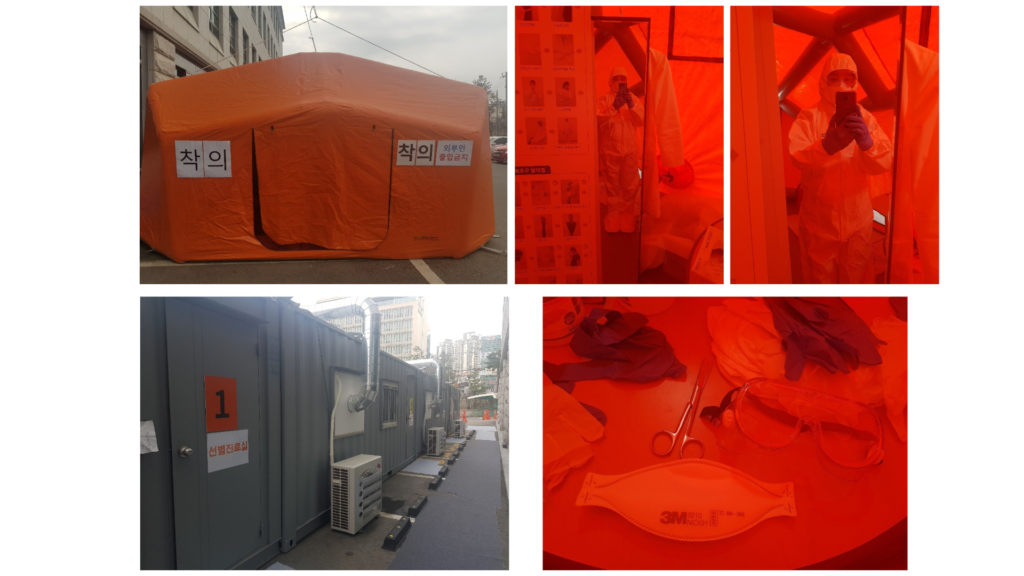I am a neurologist working at a university hospital in Goyang, a city in South Korea that is located on the outskirts of Seoul. Seoul is the most densely populated city in South Korea. Currently the number of cases in South Korea is 10,702, with 240 deaths (as of 23 April 2020). In Seoul there were 622 cases (on the 18 April) but it is a potential area for further spread. Daegu, on the other hand, is the third-largest city in the nation, and has had the largest number of people testing positive for covid-19 (6830 people; approximately seventy percent of all who have tested positive so far in South Korea).
Despite these relatively low numbers, covid-19 has had a widespread impact. Domestic economic activity has slowed down due to reduce public dining and social activities. Most schools are closed, and many universities are moving classes online. Long lines of people seeking face masks are seen in front of pharmacies, and even smartphone apps have been developed to provide information on the number of remaining masks available at each pharmacy.
Covid-19 initially did not seem to be much of an issue back in mid-January, but along with the sharp increase in the numbers of cases, fear has also grown. Walking around, I see nearly everyone wearing a mask. As most of the country is hit annually with fine dust in the wintertime, wearing masks is not unusual, but it is clear that it has now become the norm. It has also become nearly impossible to buy these masks, which had been so easily obtainable in the past. I now receive text alerts on my smartphone, announcing that patient number ## was found to have tested positive in my local area. These texts would state mostly where the patient lived and worked, the status of the decontamination process, and a reminder to visit a website that contained additional information, should I wish to know further details.
Since the covid-19 outbreak, there have been changes in the hospital that I work at. One of the major changes was the opening of covid-19 clinic. Most major hospitals in South Korea are running this type of clinic since the outbreak. Faculty of the medical school, including myself, were recruited to cover covid-19 clinic. Feeling inadequate and unfamiliar with the instructions, I would review the flow-chart of procedures. The order of events, risk factors to consider, tests (PCR and/or chest X-ray, etc.) to order were reminiscent of information I was more familiar with as an intern, but now seem to be part of an unexpected invitation from the world of infectious diseases. On my covid-19 clinic days I would receive calls from the nurse when a person arrived, and subsequently head to the tented area outside the hospital where I would put layer upon layer of gloves, don a protective gown, and securely fasten a face mask and goggles.
Pictures of covid-19 clinic and relevant equipment. The tented area for changing and dressing of medical staff; multiple container boxes are set up for covid-19 clinic; personal protective equipment and the author in protective gear are also shown.
It has been nearly three months now since my institution has undergone a complete change of scenery. Upon entering the hospital, I am immediately greeted by the Infectious Control Team clothed in disposable gowns, gloved and masked, weary-looking, but ready to measure my temperature. This is followed by a quick nod from the team member prior to being allowed to continue on my way. In my clinic I see mostly movement disorders patients, but clinic has been slow nowadays, perhaps because symptoms such as tremor are not as urgent anymore. Patients who do come for their visit wear a mask that they reluctantly take off upon my request during the neurological examination.
Covid-19 has had a major impact on society in South Korea. While the government continues to move quickly to control the outbreak, these efforts are mostly focused on testing. Currently, individuals living in South Korea are encouraged to stay at home, refrain from social gatherings, and by doing so, hopefully effectively distancing themselves. As the numbers of patients and deaths grow worldwide, I am concerned not only as a physician but also as an individual, about the impact of this novel coronavirus on our society.
Jung E Park, Department of Neurology, Dongguk University Ilsan Hospital, Goyang
Competing interests: None declared

